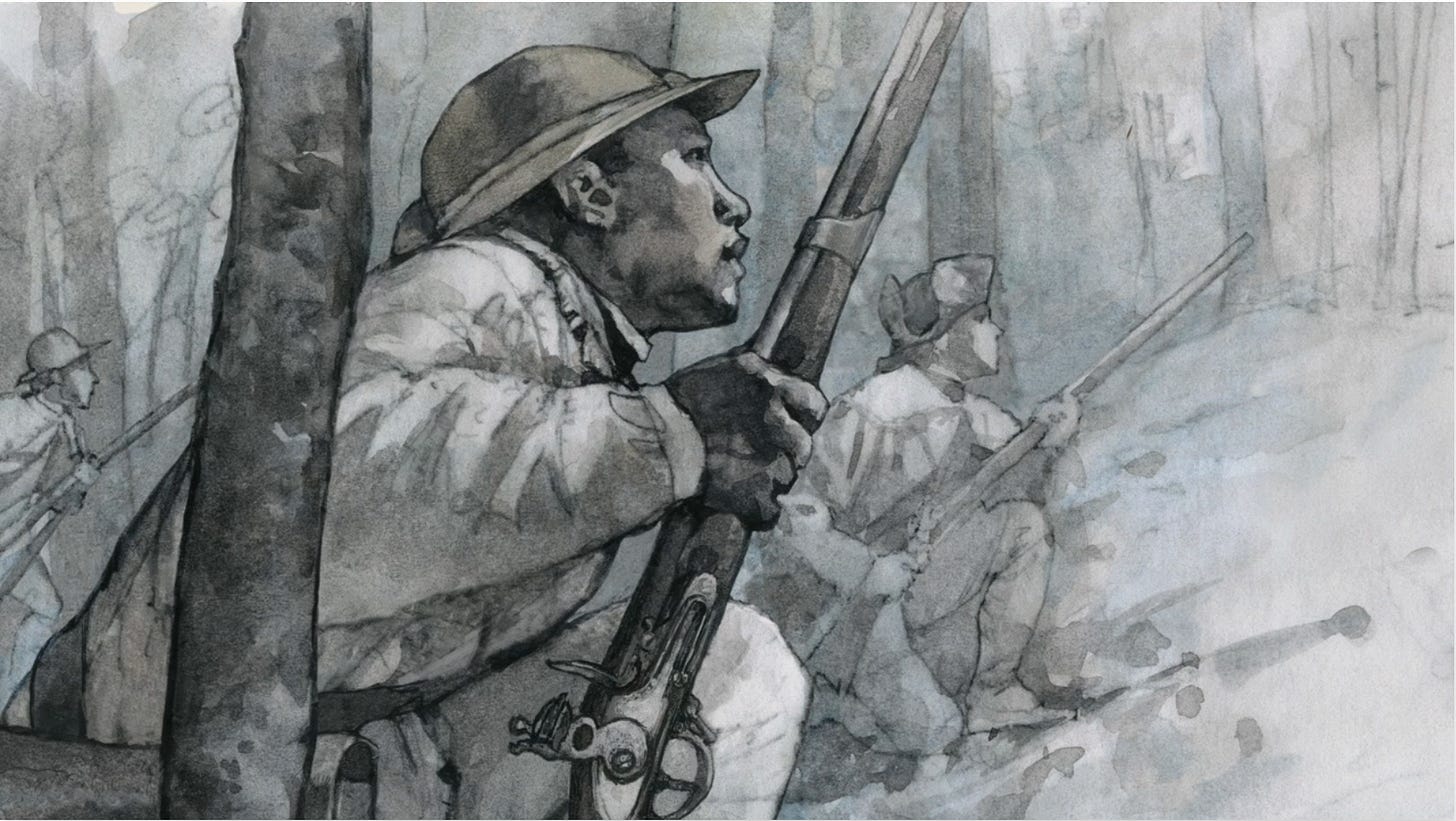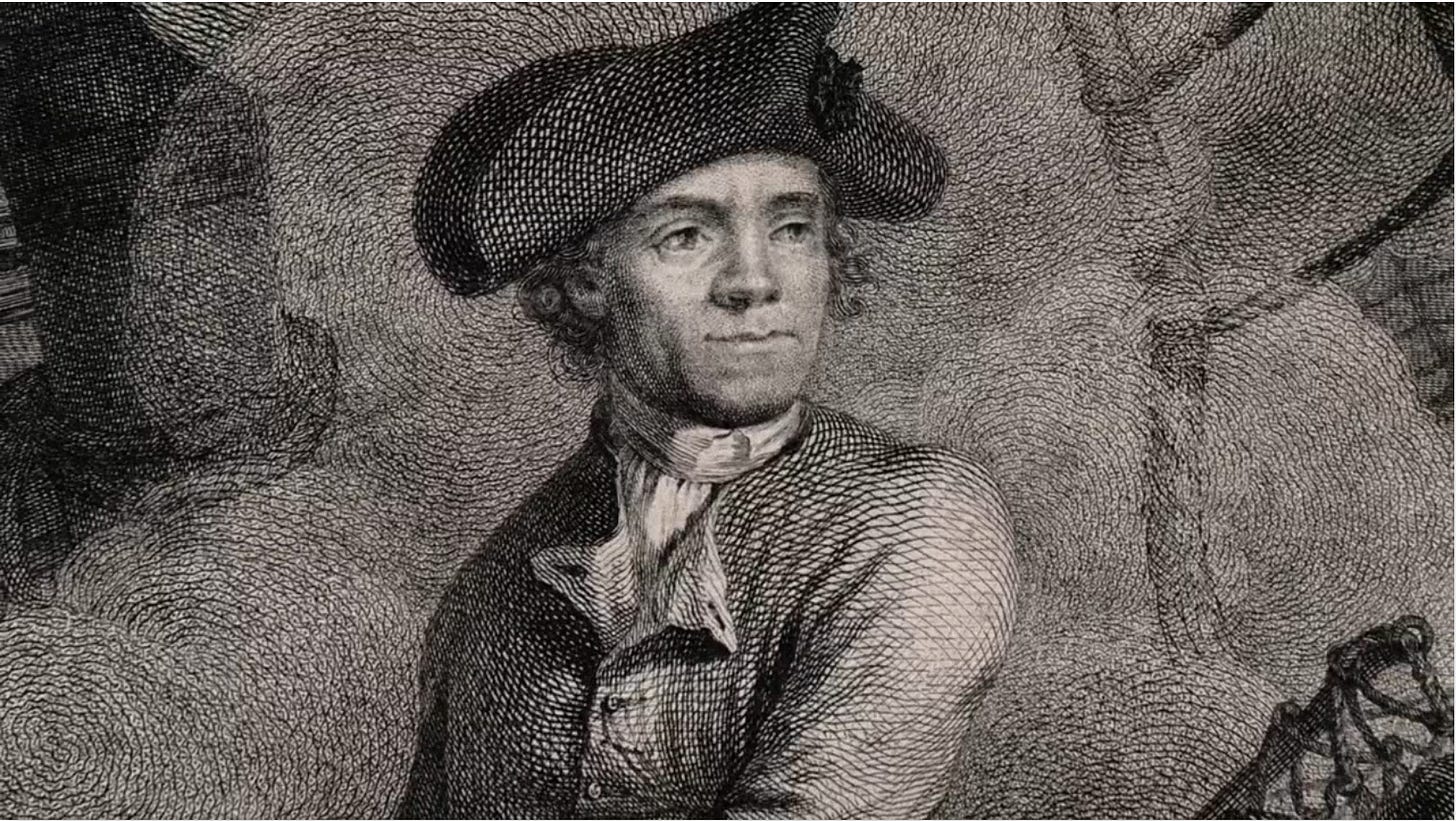Ep. 5 - Washington is "The Town Destroyer" in The American Revolution
Nine must-see minutes, glimpses of the America that could be, and my favorite pirate
Hi you,
I had to take the weekend off of recapping The American Revolution, Ken Burns’s epic documentary series on PBS. In my brief hiatus, I posted my timely conversation with Gen. Stanley McChrystal about character, enjoyed the 30-minute, MAGA-melting press conference between President Trump and NYC Mayor-Elect Zohran Mamdani, and saw Wicked: For Good in the theatre.
If you’re just joining, here’s my complete set of thoughts on all the episodes in The American Revolution
In this recap:
The Horror of George Washington
The Beauty of George Washington
It’s Self Interest Over Ideology
John Paul Ran The Seas
The Town Destroyer
My stomach turned watching this part. George Washington was a hero. He was also a villain. His premeditated slaughter of Indigenous peoples and destruction of their lands was an extraordinary act of horror. I’ve clipped 9 minutes from episode five and urge you to take the time to watch and listen.
This was about land and expansion. As we approached the end of the War, Washington gets about the business of pre-claiming lands he wants to absorb. He unleashes General John Sullivan on one of the largest operations of the entire war, to become known as the Sullivan Expedition, with this order:
The immediate objects are the total destruction and devastation of their settlements and the capture of as many prisoners of every age and sex as possible. It will be essential to ruin their crops now in the ground and prevent their planting more that the country may not merely be overrun but destroyed. You will not by any means listen to any overture for peace before the total ruin of their settlements is affected.
Several of the soldiers ordered to take part in this campaign spoke about it’s extremism and horror even against the corn and fruit trees. Some also took note of the valuable land and planned to return to claim it after the war was done.
This scorched earth campaign against the Haudenosaunee Six Nations that were allied with the British worked and cleared much of the land that’s now Pennsylvania and New York states.
A Multi-Racial, Multi-Gendered, Multi-Lingual Society
The complexity of this series is in its ability to hold the many truths of the early American story. While Washington was indeed a land speculator, expansionist, and ultimately pursuer of empire, he was also at times an evolved and inspired leader who took steps toward the nation that’s always been possible on this land.
The depiction of the scene at Valley Forge, where Washington regrouped and built a village, offered a glimpse of that America, forged as it were, from so many.
For many, English was not their native language. They spoke German, Irish, Scots, Welch, Dutch, Swedish, French, Mohican, Oneida, Wolof, Kicongo, and more. Nearly 10 percent were African-American. Most of whom served alongside whites in integrated regiments, some 60 men were enrolled in a brand new all black company belonging to the first Rhode Island regiment… The Native American soldiers and scouts at Valley Forge were Tuscaroras, Oneida, as well as Mohicans and Wappingers
There were 20,000 people living at Valley Forge including women who cooked, cleaned, raised children, cared for the sick, and sometimes, fought.
War is hell and brutal and ugly, but there’s a beauty in the braiding of so many different peoples. And yet…
Money Over Everything
I wanna give some credit to John Lawrence of South Carolina. He was the son of Henry Lawrence, president of the Continental Congress and “one of the biggest slave traders in North America.” The younger Lawrence was with General Washington in Valley Forge.
He wrote to his father words that grabbed me:
I would solicit you to cede me a number of your able-bodied men slaves. Instead of leaving me a fortune, I would bring about a twofold good. First, I would advance those who are unjustly deprived of the rights of mankind and I would reinforce the Defenders of Liberty with a number of Gallant soldiers. My dearest friend and father, I hope that my plan for serving my country and the oppressed Negro race will not appear to you the chimera of a young mind, but a laudable sacrifice of private interests to justice and the public good.
Amazing words, but Papa Lawrence rejected his son’s noble request. To free some slaves, he said, “ would simply render slavery more irksome to those who remained in it.” True.
Oh, America.
With Liberty and Justice Self Interest for All
So many times in this episode I found myself rooting for the British which was really me rooting for everybody Black (and Indigenous).
When the British shifted their war strategy to undermining the Southern colonies by undermining the system of enslavement, I was literally cheering. I know how the story ended, but it was news to me that 15,000 Black people chose to fight on the British side of the war while only 5,000 fought for the Patriots.
This was a strategic calculation. As historian Vincent Brown put it, “ For many of those enslaved people, the British represented freedom. The Patriots did not. That’s a hard story to tell to Americans.” Several historians in this series made the point that the British weren’t in principle against enslavement. They were against their colony breaking free of their control and were willing to undermine the Patriot cause by freeing some Black people from enslavement. For Black folks, it was a choice of which white people they thought offered the best path toward liberation.
The same can be said of Indigenous communities who found themselves on both sides of the War. Given the expansionist commitments of the Founders, it made a lot of sense for various tribal nations to align with The Crown. Though others sided with the Patriot out of their own calculus.
Everyone was making the most sensible decisions for themselves amidst a slew of bad options. And for the European powers that entered the war like Spain and France, they were trying to cut Britain down to size, not necessarily fight for a just cause.
This is an obvious point to those who regularly study history and power, but I cannot stress how uncommon it is to say this part out loud. The American Revolution was so much more than a group of people committed to the idea of “freedom” or “liberty” against “tyranny.” It was a massive global conflict that revealed the survival instincts and selfish motivations of people across the world.
Loose Strands
Quick aside: I’m here for the John Paul Jones series, chronicling the escapades of a Scottish-born Continental naval officer who tormented British ships all across the Atlantic. Please someone make this.
I’ll close on this.
King George III knew the ultimate stakes.
The present contest with America, I cannot help seeing as the most serious in which any country was ever engaged. Step by step, the demands of America have risen. Independence is their object. Should America succeed in that, the West Indies must follow. Ireland must soon be a separate state. Then this island would be reduced to itself and soon would be a poor island indeed.
That foresight into the reduction of Great Britain in the Little Britain must have seriously worried the King at the time. It’s a sad admission that the only way you know how to exist is to subjugate people all across the world to maintain your power and identity.
The Revolutionary War undermined the world’s largest colonial power and stoked a fire that would never die. While the motivations of all its participants were not pure, the consequence was to remind empires that their grip on power is always temporary and that the people can at any moment organize to assert their own power on their own behalf. It’s the irony of Spain and France helping a bunch of insurrectionists overthrown their fellow colonial power, Great Britain, and it’s a lesson that still resonates today.
As always, please share your own thoughts on the series





I've been following you for years and you are only getting better. I watched Episode 5 yesterday and came away with the sad notion that everything I had been taught to believe is bullshit and the American Revolution was, like everything I've seen in a lifetime here in Arizona, a real estate play in which the colors of the people don't matter except insofar as they are obstacles.
We truly are a white supremacist country back to the get-go. I don't know what to do about celebrating July 4 in the future. And in retrospect, black people can be said to be fortunate because they were deemed too useful to kill and scalp for souvenirs. Lucky you! Can you tell that this film has left me cynical and depressed?
Glad I wasn't the only one cheering on the British!